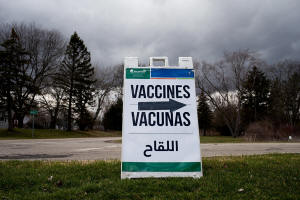Do I need to worry about COVID again?
 Send a link to a friend
Send a link to a friend
 [September 07, 2023]
By Deena Beasley and Julie Steenhuysen [September 07, 2023]
By Deena Beasley and Julie Steenhuysen
(Reuters) - New data from scientists and vaccine makers Moderna and
Pfizer/BioNTech suggests that a newer, highly mutated variant of the
virus that causes COVID-19 is not as alarming as some experts had feared
when it was first detected several weeks ago.
Nicknamed "Pirola" on social media, the BA.2.86 Omicron subvariant is
being tracked by both the World Health Organization (WHO) and the U.S.
Centers for Disease Control and Prevention (CDC).
What is new about COVID?
COVID infections and hospitalizations have been rising in the U.S.,
Europe and Asia, but are well below previous peaks. The weekly U.S.
hospitalization growth rate slowed for three consecutive weeks in
August, according to CDC data for the week ended Aug. 26.
As of Aug. 30, CDC said the BA.2.86 variant was detected in at least
four U.S. states in people or wastewater. Delaware on Tuesday said it
had detected a BA.2.86 infection at a hospital. The WHO has reported
finding BA.2.86 in at least six countries.
According to CDC data, the EG.5 subvariant, a descendant of the Omicron
lineage nicknamed "Eris" on social media that originally emerged in
November 2021, accounts for about a fifth of current U.S. COVID cases.

A variant nicknamed "Fornax," officially FL.1.5.1, is the next largest
at 14.5% of U.S. infections, and represents a growing share of East
Coast COVID cases. A wide range of other variants account for smaller
shares of the total, with BA.2.86 currently representing less than 1%.
Dr. David Dowdy, an infectious disease epidemiologist at Johns Hopkins
Bloomberg School of Public Health, believes FL.1.5.1 will become the
predominant COVID variant in the coming months, but he does not expect
an infection wave like the one driven by Omicron last winter.
Dowdy suggested that the current surge in cases may be due to immunity
from vaccination and infection wearing off some since the last surge.
What do scientists say about BA.2.86?
Scientists have been keeping an eye on BA.2.86 because it carries more
than 35 mutations in key portions of the virus compared to XBB.1.5, the
dominant variant through most of 2023.

[to top of second column]
|

A sign pointing to a clinic where residents who are over 50 years
old and immunocompromised can receive their second booster shots of
the coronavirus disease (COVID-19) vaccines in Waterford, Michigan,
U.S., April 8, 2022. REUTERS/Emily Elconin/File Photo
 The dramatic changes - on par with
the genetic shift seen in the Omicron variant compared with its
Delta predecessor - raised concerns that the new variant could cause
a major surge.
Experiments testing versions of the virus in two U.S. independent
laboratories suggest that is unlikely, said Dr. Dan Barouch,
director of the Center for Virology and Vaccine Research at Beth
Israel Deaconess Medical Center in Boston, whose lab led one of the
studies.
His team tested lab-made versions of the virus in people who were
vaccinated or previously infected and found that antibodies against
the variant were comparable or slightly higher than those against
current circulating variants.
Experiments done in the lab of Dr. David Ho at Columbia University,
as well as by teams in Sweden and China, had similar findings.
Will vaccines protect against new variants?
Barouch's studies also suggested that newly updated vaccines will
raise antibody responses "to some extent" against all of the
currently circulating variants, including BA.2.86.
Moderna on Wednesday said clinical data showed that its retooled
COVID vaccine generated a nearly 9-fold increase in human antibodies
that can neutralize BA.2.86.

Pfizer said on Wednesday that its updated COVID shot showed
neutralizing activity against BA.2.86 and EG.5 in studies conducted
on mice.
The updated shots are being reviewed by the U.S. Food and Drug
Administration and are expected to be available this month.
(Reporting By Deena Beasley and Julie Steenhuysen; Editing by Bill
Berkrot)
[© 2023 Thomson Reuters. All rights
reserved.]This material may not be published,
broadcast, rewritten or redistributed.
Thompson Reuters is solely responsible for this content. |